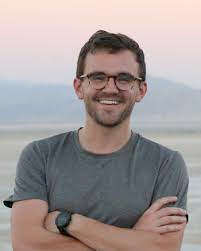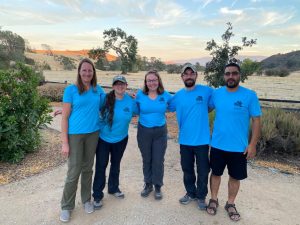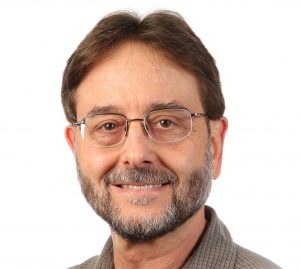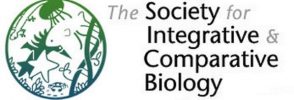Contents
Message from the Chair
Jon Harrison, chair.dcpb@sicb.org

I am very pleased to announce that our Bartholomew Award winner and speaker for 2023 SICB is Dr. Eric Riddell, of the Department of Ecology, Evolution and Organismal Biology at Iowa State University. His provisional title is “Organismal physiology as a lens into the fundamental niche.”
Remember that the DCPB social follows the Bartholomew Award presentation. It will be a great time to relax, mingle and network.
This year we will have a new format for the DCPB student paper competition. The top submissions will be selected for oral presentations in a special DCPB Best Student Oral Presentation Competition section, which we hope will bring more eyes and attention to our outstanding young scientists. All remaining competitors will be in the poster competition.
DCPB Student and postdoctoral Affairs representative (SPDAC), Maria Stager, has just started up her lab as an Assistant Professor at University of Massachusetts, Amherst. Congratulations Maria! We are looking for students and postdocs interested in serving as the new representative for postdocs in DCPB – if interested please send a CV and short cover letter explaining why you are interested to DCPB chair Jon Harrison (chair.dcpb@sicb.org).
I’m really looking forward to seeing you all in Austin!
Message from the Program Officer
Mike Sears, dpo.dcpb@sicb.org
I just returned from our planning meeting in Austin for the coming meeting. Our annual meeting is back to pre-pandemic numbers with over 1800 abstracts, with 129 from our division. We will have our Best Student Presentation session on the first afternoon of the meeting with 9 talks in play. On the second day of the meeting we will have our Best Student Poster session. If all goes well, we should be able to announce the winners during the Bartholomew Award Social!
At this year’s meeting we will be (co-)sponsoring the following six symposia:
- Sexual diversity and variation, Organizers: Kelsey Lewis, Sam Sharpe
- Daily torpor across birds and mammals: Recent progress and how do we advance the field?, Organizers: Anusha Shankar, Kenneth Welch
- Pathways to adulthood: environmental, developmental, and evolutionary influences on the ontogeny of form and function, Organizers: Terry R. Dial, Mark C. Mainwaring, Ashley M. Heers
- Large-scale biological phenomena arising from small-scale biophysical processes, Organizers: Jeanette Wheeler, Karen Cha
- Biology at birth: the role of infancy in providing the foundation for lifetime success, Organizers: Christopher Mayerl, Rebecca German
- Envisioning a Diverse, Inclusive & Safe Future for Field Biology, Organizers: Vanessa K Hilliard Young, Robin Verble, Corinne L. Richards Zawacki
We will announce our symposia for the 2024 Seattle meeting soon. And, it’s not too soon to begin thinking about symposium proposals for the 2025 meeting in Atlanta. Feel free to contact me if you have ideas.
Finally, I am excited to announce that SICB will be holding a new end-of-the-meeting party to celebrate the achievements of our members. Look for details from SICB Program Officer Thom Sanger. The event should be a great ending to the meeting.
Message from the Secretary
Caroline Williams, secretary.dcpb@sicb.org

Greetings to all our DCPB members! It’s a great time for our discipline, with many exciting discoveries advancing our understanding of integrative and comparative physiology and biochemistry. Thank you for your participation in the spring/summer elections, and thank you to all candidates for your willingness to support our division. We would like to congratulate and welcome our newly-elected officers Dr. Jason Podrabsky (Chair-Elect) and Dr. Alex Gerson (Program Officer), who will take over from our current officers after the 2023 meeting in Austin, Texas.
The new SICB website is beautifully designed and easy to navigate, giving access to our divisional resources including our updated bylaws. However, please check that your DCPB affiliation is current and that you have paid your $5 divisional dues, because we lost many members in the changeover. The dues are used to fund symposia (including at other meetings such as the American Society of Physiology Comparative meeting, which will be held Oct 28- Nov 1, 2022 in San Diego), and for the Bart award social at the SICB annual meeting.
If there is any news you would like to share with the DCPB membership, including job ads, postdoctoral positions, and opportunities for students, please feel free to contact me at Secretary.DCPB@sicb.org.
DCPB Member Research Highlight: Ted Garland

DCPB member Dr. Theodore (Ted) Garland Jr. is a Distinguished Professor of Evolution, Ecology, and Evolutionary Biology at UC Riverside. Dr. Garland’s research focuses on the evolution of complex traits involving behavior and physiology, and since the early 1990s his lab has evolved lines of mice selected for high voluntary running ability (see, High Runner Mice). This elegant artificial selection experiment illustrates that running behavior evolves first, followed by an increase in many interacting physiological systems that allow increased aerobic performance. These lines have now hit 100 generations of selection, and the long-running experiment has resulted in hundreds of published papers with students and trainees, inquiry-based classroom activities for middle schoolers, and now a book entitled “Born to Run: Experimental Evolution of Exercise Behavior and Physiology in a Vertebrate Model Organism,” which is currently in preparation. Dr. Garland was one of the founders of the field of Evolutionary Physiology, which aims to understand how and why the way organisms function has changed over time, by incorporating phylogenetic methods, selection experiments, and genetics and genomics into physiological studies. This year Dr. Garland and colleagues published an overview of progress in the field of Evolutionary Physiology (Galván et al. 2021), illustrating the large impacts that evolutionary biology has had on the understanding of physiology, including human health and disease, and the reciprocal impacts that physiology has had on evolutionary biology. Dr. Garland has also published a recent Invited perspective on the roles of trade-offs and constraints in organismal evolution (Garland et al. 2022), providing a much-needed framework for studying the different categories of trade-offs that organisms experience. As a DCPB member, Dr. Garland’s work has had and continues to have far-reaching impacts on the fields of physiology and evolutionary biology.
- Galván, I., T. S. Schwartz, and T. Garland, Jr. 2021. Evolutionary physiology at +30: has the promise been fulfilled? BioEssays 2021:2100167. https://onlinelibrary.wiley.com/doi/10.1002/bies.202100167
- Garland, T., Jr., C. J. Downs, and A. R. Ives. 2022. Invited Perspective: Trade-offs (and constraints) in organismal biology. Physiological and Biochemical Zoology 95:82-112. https://www.journals.uchicago.edu/doi/full/10.1086/717897
